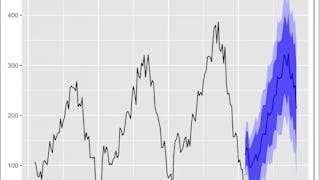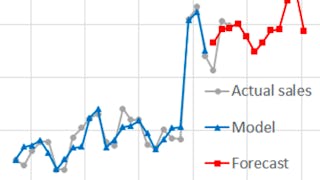Ce cours est le deuxième d'une spécialisation pour l'apprentissage automatique pour les fondamentaux de la chaîne d'approvisionnement. Dans ce cours, nous explorons tous les aspects des séries temporelles, en particulier pour la prédiction de la demande. Nous commencerons par nous familiariser avec les concepts de base des séries temporelles, notamment la stationnarité, la tendance (dérive), la cyclicité et la saisonnalité. Ensuite, nous analyserons les méthodes de corrélation en relation avec les séries temporelles (autocorrélation). Dans la seconde moitié du cours, nous nous concentrerons sur les méthodes de prédiction de la demande à l'aide de séries temporelles, telles que les modèles autorégressifs. Enfin, nous terminerons par un projet de prédiction de la demande à l'aide de modèles ARIMA en Python.



Prévision de la demande à l'aide de séries temporelles
Ce cours fait partie de Spécialisation L'apprentissage automatique pour les chaînes d'approvisionnement


Instructeurs : Rajvir Dua
3 717 déjà inscrits
Inclus avec 
(33 avis)
Expérience recommandée
Ce que vous apprendrez
Construire des modèles ARIMA en Python pour prédire la demande
Développer le cadre pour des réseaux neuronaux plus avancés (tels que les LSTM) en comprenant l'autocorrélation et les modèles autorégressifs.
Compétences que vous acquerrez
- Catégorie : Apprentissage automatique
Détails à connaître

Ajouter à votre profil LinkedIn
5 devoirs
Découvrez comment les employés des entreprises prestigieuses maîtrisent des compétences recherchées

Élaborez votre expertise du sujet
- Apprenez de nouveaux concepts auprès d'experts du secteur
- Acquérez une compréhension de base d'un sujet ou d'un outil
- Développez des compétences professionnelles avec des projets pratiques
- Obtenez un certificat professionnel partageable


Obtenez un certificat professionnel
Ajoutez cette qualification à votre profil LinkedIn ou à votre CV
Partagez-le sur les réseaux sociaux et dans votre évaluation de performance

Il y a 4 modules dans ce cours
Dans ce module, nous allons nous familiariser avec les séries temporelles en Python. Nous commencerons par nous familiariser avec la place des séries temporelles dans le paysage de l'apprentissage automatique. Ensuite, nous découvrirons les principaux types de séries temporelles et leurs facteurs distinctifs, notamment la période, la fréquence et la stationnarité. Après avoir appris à tracer des séries temporelles en Python, nous explorerons les différences entre la saisonnalité et la cyclicité.
Inclus
7 vidéos3 lectures2 devoirs1 sujet de discussion
Dans ce module, nous nous pencherons sur les notions d'autocorrélation et d'indépendance. Nous commencerons par étudier les mathématiques de la corrélation et la manière dont elle peut être utilisée pour caractériser la relation entre deux variables. Ensuite, nous définirons sa relation avec l'indépendance et expliquerons où ces idées peuvent être utilisées. Enfin, nous combinerons la corrélation avec les attributs des séries temporelles, tels que la tendance, la saisonnalité et la stationnarité, pour obtenir l'autocorrélation. Nous verrons à la fois la théorie qui sous-tend l'autocorrélation et la manière de la coder en Python.
Inclus
8 vidéos2 lectures2 devoirs1 sujet de discussion
Dans ce module, nous commencerons par revoir certains des concepts de base de la régression linéaire. Ensuite, nous étendrons ces connaissances à la régression décalée, un moyen efficace d'utiliser les techniques de régression sur les séries temporelles. Une fois que nous aurons acquis de solides connaissances en matière de régression de base et de régression décalée, nous explorerons des méthodes modernes telles que l'ARIMA (moyenne mobile intégrée autorégressive). Tout cela permet de construire le cadre de modèles d'apprentissage automatique plus avancés, tels que les LSTM (réseau de mémoire à long terme).
Inclus
4 vidéos1 lecture1 devoir1 devoir de programmation1 sujet de discussion1 laboratoire non noté
Dans le projet de fin d'études, nous ferons des prévisions de la demande à l'aide de modèles ARIMA.
Inclus
1 devoir de programmation1 laboratoire non noté
Instructeurs

Offert par
Recommandé si vous êtes intéressé(e) par Apprentissage automatique


Coursera Project Network


Rutgers the State University of New Jersey


Macquarie University
Pour quelles raisons les étudiants sur Coursera nous choisissent-ils pour leur carrière ?




Avis des étudiants
33 avis
- 5 stars
50 %
- 4 stars
5,88 %
- 3 stars
8,82 %
- 2 stars
14,70 %
- 1 star
20,58 %
Affichage de 3 sur 33
Révisé le 12 sept. 2022
Great course to gain fundemantals of Time Series Analyses for Demand Forecasting..


Ouvrez de nouvelles portes avec Coursera Plus
Accès illimité à 10,000+ cours de niveau international, projets pratiques et programmes de certification prêts à l'emploi - tous inclus dans votre abonnement.

Faites progresser votre carrière avec un diplôme en ligne
Obtenez un diplôme auprès d’universités de renommée mondiale - 100 % en ligne

Rejoignez plus de 3 400 entreprises mondiales qui ont choisi Coursera pour les affaires
Améliorez les compétences de vos employés pour exceller dans l’économie numérique
Foire Aux Questions
L'accès aux cours et aux devoirs dépend de votre type d'inscription. Si vous suivez un cours en mode audit, vous pourrez consulter gratuitement la plupart des supports de cours. Pour accéder aux devoirs notés et obtenir un certificat, vous devrez acheter l'expérience de certificat, pendant ou après votre audit. Si vous ne voyez pas l'option d'audit :
Il se peut que le cours ne propose pas d'option d'audit. Vous pouvez essayer un essai gratuit ou demander une aide financière.
Le cours peut proposer l'option "Cours complet, pas de certificat" à la place. Cette option vous permet de consulter tous les supports de cours, de soumettre les évaluations requises et d'obtenir une note finale. Cela signifie également que vous ne pourrez pas acheter un certificat d'expérience.
Lorsque vous vous inscrivez au cours, vous avez accès à tous les cours de la Specializations, et vous obtenez un certificat lorsque vous terminez le travail. Votre certificat électronique sera ajouté à votre page de réalisations - de là, vous pouvez imprimer votre certificat ou l'ajouter à votre profil LinkedIn. Si vous souhaitez uniquement lire et visualiser le contenu du cours, vous pouvez auditer le cours gratuitement.
Si vous vous êtes abonné, vous bénéficiez d'une période d'essai gratuite de 7 jours pendant laquelle vous pouvez annuler votre abonnement sans pénalité. Après cette période, nous ne remboursons pas, mais vous pouvez résilier votre abonnement à tout moment. Consultez notre politique de remboursement complète.



